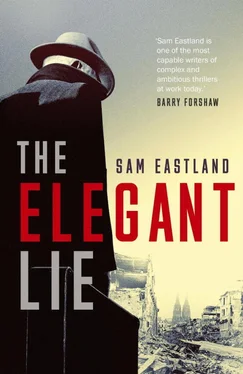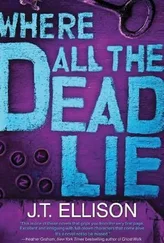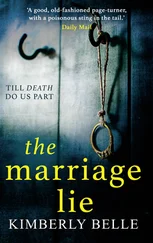When Carter tried to explain that Major Wharton had ordered the boy to be transported to division headquarters for further interrogation, the prosecution countered with the assertion that no German prisoner had been delivered, and that no American soldiers had come forward to back up Carter’s claim.
At that point, Captain Ottway had jumped to his feet. ‘So where is he?’ demanded Ottway. ‘Where is the boy? Where is the proof that he said anything at all?’
The judge turned to Carter. ‘Do you deny that he predicted the attack?’
Ottway turned and stared at Carter, a meaningful look on his face.
Carter understood that if he lied and said that the boy had not mentioned an attack, or even if he could not remember what the boy had said, the case would most likely collapse, since it would rest entirely upon the testimony of a Belgian woman who had intervened on behalf of an enemy soldier belonging to a branch of service that was guilty of innumerable war crimes, including upon American soldiers in the recent offensive.
‘You will recall that you are under oath,’ said the judge.
For one strange, hovering moment, Carter seesawed back and forth in his mind about whether or not he should lie. He found himself thinking about everything Riveira had told him on their drive from Rocherath. The world in which they found themselves now was so filled with contradictions that the contradictions themselves became the only things that made any sense. But it became suddenly clear to him that if he lied now, a part of him would always be marooned here in this twilight world.
‘He told us there would be an attack,’ said Carter and, as he spoke, the fog of disbelief that had surrounded him since he’d first been put under arrest suddenly dispersed. He felt no less helpless than before, but he was no longer afraid.
Ottway showed no emotion. He just looked down at his notes, scribbled something in the margin and then dropped his pencil on the page, the soft, tapping sound carrying with it a strange but unmistakable finality.
‘What kind of an attack?’ asked the judge.
‘Big,’ replied Carter.
‘And when?’
‘Soon.’
‘That’s it?’
‘Yes, sir.’
‘And what did Major Wharton think of that?’
‘He said the boy was lying,’ Carter told the judge. ‘He compared it to the noises of those tanks we were hearing in the distance and how they were just recordings played to intimidate us.’
The judge and the prosecutor glanced at each other.
Ottway looked up suddenly. ‘Things,’ he said, ‘which had also been reported to headquarters, and which headquarters chose to ignore. This is in addition to accounts from other German deserters who crossed the lines last month, bringing stories of an impending assault.’ He reached into his briefcase and pulled out a thick file of documents. ‘Not to mention reports from civilians who had seen and heard things that made them suspect something was coming.’ He lifted the file. ‘Shall we take a look at these as well?’ he asked. ‘All of them ignored by men who should have known better. And now you want to court martial a man who had no training as a soldier, whose only crime, if you can call it one at all, was to sit in the same room as a veteran officer who reached the same conclusion as the generals to whom he reported?’
The judge flapped one hand, lazily commanding Ottway to sit. ‘That will do,’ he said.
The trial lasted two hours.
When Ottway and the prosecuting lawyer had finished their closing arguments, the judge ordered Carter to stand. ‘Do you have any questions?’ he asked.
‘Yes, sir.’
The judge looked a little surprised, as if no one had ever taken him up on that offer before. ‘Go ahead,’ he told Carter.
‘What would you have done if you were me?’ he asked.
The judge thought about this for a moment. ‘Probably the same as you,’ he said at last, ‘but that doesn’t change anything.’
Carter went back to his cell, a white-helmeted military policeman walking close behind him. This time, he left the door open and Carter just sat on his bunk in the corner, with no idea how things were going to pan out.
He didn’t have long to wait.
Ottway came to fetch him. He was smiling.
‘What happened?’ asked Carter.
‘We’re about to find out,’ replied Ottway.
They walked back to the room where the trial had been held, in order to be present for the verdict.
Standing once more before the judge, Carter was informed that he had been found guilty of failing to report information, but not guilty of deliberately withholding that information.
Apparently, this was all the difference in the world.
The judge then informed Carter that he had been dishonourably discharged from his temporary commission and would no longer be allowed to continue his investigation into the theft of military fuel. ‘Do you understand?’ asked the judge.
‘Does this mean I’m going home?’
‘I would, if I were you,’ said the judge.
‘What about my report?’
‘You mean the one in which you accused a decorated front line commander of selling fuel to the enemy?’
‘I’m glad somebody read it.’
‘Oh, you can be sure of that,’ said the judge.
Ottway rested a hand on Carter’s shoulder. ‘It’s time to go,’ he whispered.
‘Take your lawyer’s advice,’ said the judge, ‘and travel safely.’
After his meeting with Wilby, Carter pedalled his bicycle to the compound. He wondered if Dasch had learned about Galton’s escape from prison. Even if the news has reached him, thought Carter, there is nothing he can do about it now and, grateful as he might be to have avoided arrest, he still doesn’t have the black market goods I promised to deliver. Carter doubted whether Wilby would set up another purchase, which meant that he had to find some other way to make himself useful. With these thoughts rattling like dice inside his skull, Carter arrived at the compound.
Dasch was there to meet him at the gate. ‘You’re just in time,’ he said.
‘In time for what?’ he asked.
‘You’ll see.’ Dasch beckoned for Carter to follow. Instead of leading him inside, Dasch brought Carter around the edge of the fence and they set out through the tall grass, across the open stretch of wasteland that bordered one side of the compound.
As they walked, grass seed clung to their legs and startled crickets launched themselves out of their path with a snapping of bristly legs.
Carter began to see objects lying half buried in the undergrowth◦– a large curl of metal from what had once been the cowling of a car, a half-melted eagle from a bronze lamp stand, a bed frame still laced with rusty springs, and a strip of corrugated iron, its scalloped edges grinning from the weeds.
‘What is this place?’ asked Carter.
‘Better to ask what it was,’ replied Dasch, and he went on to describe what had once been a bustling village of workshops where the car mechanics, wheelwrights, tool and die makers and welders of Cologne had run their small and nameless businesses. On weekends back before the war, the dusty alleyways that ran between the booths would be filled with the crackle of welding sparks and the growl of engines as they were coaxed back to life. It had been known as the Eisengasse, and it was said that anything that had broken in the city of Cologne, no matter how obscure or badly damaged, could be brought here and someone would be on hand to fix it. A single 5,000lb bomb, dropped from a Royal Air Force Lancaster the night of 1st June 1942, had landed in a storage area containing hundreds of propane cylinders. This had ignited a fire that burned out of control for a week, since the fire crews were too busy with damage caused to the inner city during the same raid. By the time a heavy rainfall finally extinguished what was left of the Eisengasse blaze, not a single structure remained intact. Many had been so obliterated that their owners, returning to the spot, could find no trace that anything had been there at all. ‘It was two years before anything grew here again,’ said Dasch. ‘But now there are dandelions, thistles, chickweed and poppies. Nature will reclaim everything in time. It always does.’
Читать дальше











